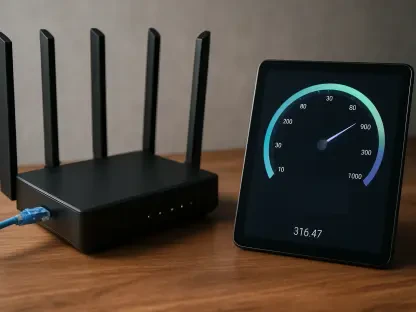In the face of aging infrastructure and rising resource demands, the utilities industry presents a compelling challenge that requires innovative solutions. This industry encompasses sectors like wind energy, oil and gas, and utilities processing plants, which are essential for delivering electricity, water, and heating worldwide. Today, private mobile networks (PMNs) emerge as a transformative force, offering secure, reliable connectivity tailored to overcome various sector-specific obstacles. These networks facilitate real-time data, automation, and integration with advanced technologies, paving the way for enhanced operational efficiency and safety in critical environments.
High-Performance Connectivity Redesigns Utilities
Private mobile networks deliver dedicated connectivity that revolutionizes utility operations. By offering complete control over bandwidth, security, and coverage, PMNs excel in supporting mission-critical applications. Their secure framework enables real-time data access and automation, allowing utilities to optimize processes on the go. Utilities benefit from seamless communication networks that bridge the gap between field operations and control centers, facilitating instantaneous data exchange across teams and regions. This approach empowers data-driven decision-making, crucial in modernizing infrastructure and optimizing resource management.
Wind Energy: A Paradigm Shift with PMNs
Wind farms, particularly those in remote or offshore locations, capitalize significantly on private mobile networks. PMNs enable real-time communication solutions, ensuring operators can conduct remote diagnostics, addressing technical issues efficiently without visiting distant sites. The preemptive capability of predictive maintenance powered by sensor data prevents mechanical problems before escalation, while turbine performance optimization dynamically adjusts energy output according to real-time wind conditions. These advancements lead to minimal operational delays and costs, fostering increased energy generation efficiency.
Elevating Oil and Gas Operations
In extensive, often hazardous environments characteristic of the oil and gas industry, PMNs play a pivotal role in maintaining safety and efficiency. Continuous pipeline monitoring utilizing IoT sensors offers detailed insight into pressure levels, flow rates, and temperature changes, swiftly identifying anomalies like leaks. Furthermore, automated inspections executed through drones and robotic systems enhance safety by accessing high-risk zones without manual intervention. The overall secure communication fosters coordination between field crews and emergency response units, ensuring immediate action and reducing downtime during critical incidents.
Optimizing Processing Plants
Utilities processing plants thrive on precision and automation, achieved through private mobile networks. Integrating IoT-driven process control, PMNs enable comprehensive data collection and analysis from diverse facility areas, propelling enhanced production standards. Predictive equipment maintenance identifies inefficiencies early, averting breakdowns and securing consistent product quality, while automation in logistics and material handling improves the movement of materials using autonomous vehicles and robotic systems. These innovative measures ultimately streamline operations, boost productivity, and enhance safety protocols.
Moving Toward a Smarter Future
As the utilities industry evolves, PMNs will further integrate to resolve current infrastructure challenges while remaining poised to embrace emerging technology trends. With their flexibility and security, these networks facilitate not only addressing existing barriers but also setting a foundation for sustainable innovation and reliable service. PMNs ensure readiness for future industry demands, becoming key enablers for smart infrastructure and intelligent communication frameworks. Their role in transforming utilities is indispensable, contributing to a more efficient, resilient, and connected world.
To conclude, the utilities industry has recognized private mobile networks as crucial tools, contributing substantially to operational advancements in response to sector-specific challenges. These networks have seamlessly integrated secure, real-time data solutions across utilities, streamlining operations and enhancing safety in resource-intensive and complex environments. Embracing PMNs positions utility companies to redefine their operational frameworks, preparing for future sustainability goals and adapting to technological shifts toward smarter, more connected systems. The advancement in PMNs has demonstrated transformative capabilities, setting the stage for ongoing innovation and elevated performance within the industry.









